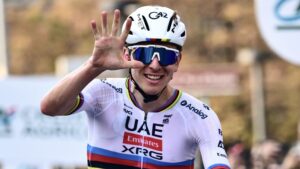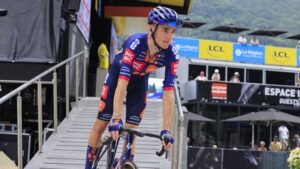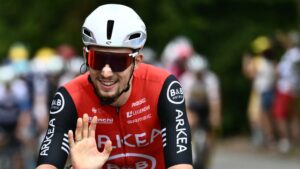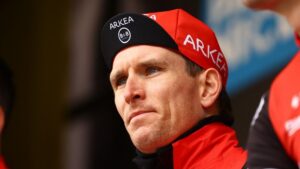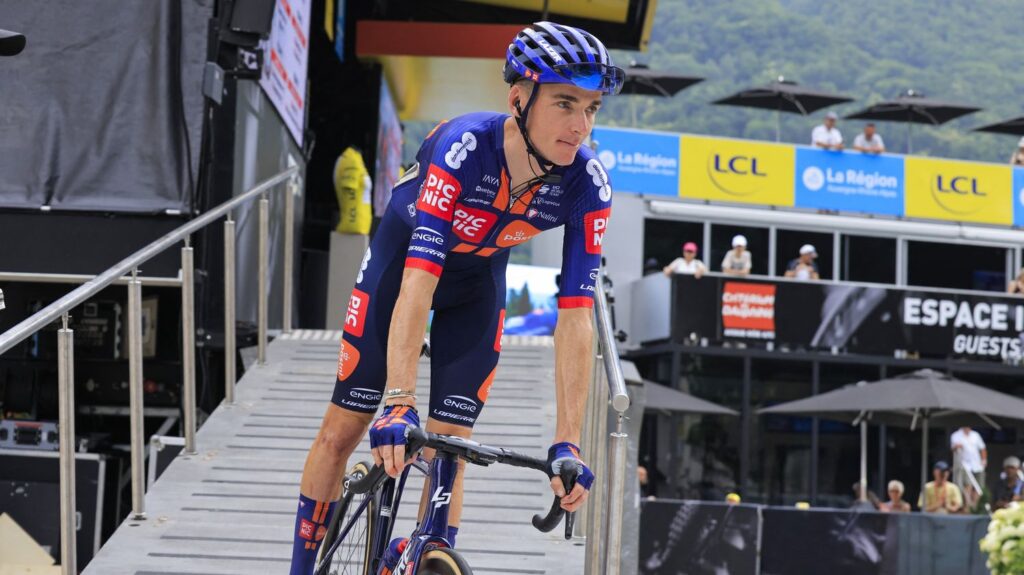
Dazzling handlebars in hand when the slope rises, Romain Bardet is much more discreet in life. A habit that the Auvergne has left aside. Retired from the peloton since June, the best climber of the 2019 Tour de France will compete in his first gravel world championships on Sunday October 12, after winning two World Cup stages.
For the occasion, the runner who will celebrate his 35th birthday in November, reveals himself in the mini-documentary “A quiet shift”. He talks about his transition between professional road cycling and gravel, but above all a personal quest centered on the desire to have fun. The 2018 world vice-champion looks back at length for franceinfo: sport. Interview with a peaceful young retiree.
Franceinfo: sport: You will participate in your first gravel world championships on Sunday. Is the goal to go and get the rainbow jersey that you touched with your fingertips in Innsbruck (Austria) in 2018?
Romain Bardet: No, I'm not here to go for the rainbow at all costs. Afterwards, when I have a bib on my back, I always like to do the best possible. I would have liked these Worlds to take place, as planned in Nice. It would have had a certain sentimental value, because I finished my last Tour de France there, and I trained there in the winter. The course was more to my advantage. But they take place in Maastricht (Netherlands), ultimately, and it's also a great story, because it's close to the HQ of my PicNic-DSM team, which allowed me to choose my outing on the Dauphiné and which accompanies me today in gravel.
After ending your road career in June, you immediately started – successfully – a new career in gravel. Why this choice?
For four years, I had incorporated gravel into my training. I always loved mountain biking, but the position was too different from the road. Before being a career change, gravel was a breath of fresh air in my last years as a professional. And that's how I discovered competitions. It's an interesting transition to keep in shape, to continue practicing, because I simply like cycling. It allows me to meet up with friends on events, to run with them for the first time in over fifteen years. Behind each gravel race, there is a story, we meet up with family, with friends. We share moments of life thanks to this.
More than victory or the adrenaline of the race, we sense in your documentary that what drives you is above all having fun on the bike…
It’s a state of mind, yes. In truth, you rarely win on a bike, so I have learned to find joy and motivation elsewhere than in victory. In gravel, I'm not here to build a track record but to share moments with people I love on fun events, on a human scale, while enjoying my form. I'm not here to brag and beat others at all costs.
We also saw it at the French championships, where you finished in second place, all smiles, while applauding the winner Hugo Dréchou, who beat you in the sprint. It's rare to see such a good second player, right?
With Hugo, we raced until the end but I told him that I would not compete in the sprint. We had done well. Hugo has been doing gravel for years, he is committed. I find it good that it is he who is crowned champion of France. On the other hand, for the Worlds on Sunday, it is different, even if it is not the return match of any previous disappointment. I'm going to race to the end, because we won't be between French people, so it would be good to tickle the Belgians and the Dutch…
What do you like so much about gravel?
Already, I ride according to my mood of the day. I no longer force myself to have a session, because I no longer want to. What I like the most is changing terrain during the same race. Thursday morning, for example, I was sleeping near Boulogne-Billancourt. I didn't want to drive at all. I found a trail to follow in the Saint-Cloud forest, it was super fun, without traffic. I had a feeling of speed between the trees. And at the same time it remains a very sporty bike, you can take parts of the road without being out of step like in mountain biking.
“Gravel avoids planning, since you go everywhere. It’s a feeling of freedom.”
Romain Bardet, former yellow jersey at the Tour de Franceat franceinfo: sport
It is also a travel discipline. I left for five days this summer with the bag, for example. In competition, it's also a return to basics, without assistance, without being able to change bikes, alone with him. In addition, I have a beautiful bike, which the team gave me when I retired, with colors that I like. I'm happy to release it!
Precisely, this bike shows that the world of gravel is quickly professionalizing. And this is reflected in the racing averages, sometimes close to 40 km/h.
Yes it goes very quickly in gravel, I was surprised! Whether on the road or on unstable surfaces. We have big tires and superior comfort to absorb everything, but the bikes remain quite close to the road, including in the positioning. Technically, sometimes there are more complicated passages, but I was impressed to see the speed averages. I thought I would see a lot of people like me, there for the pleasure above all, even if the bib always awakens the competitive spirit. I saw a lot of specialized profiles. It becomes a discipline in its own right with pros who do just that, and who raise the level. Many riders have nothing to envy at World Tour level.
Do you think that competitive gravel racing will grow, and why not become Olympic one day?
If I was attracted to gravel, it's because it's quite unconventional. This does not meet the high performance standards that will come if gravel evolves in the sporting hierarchy. I find it good that it remains broad and open, with races sometimes lasting ten hours. If teams are structured, it will become a secondary circuit of the road and it will lose its essence.
In the documentary, what emerges from your new life is a feeling of calm. We are far from the retiree who is unable to stop cycling, and who finds a new playground to fill the void left by the “little death” that is retirement from sport.
Exactly. In fact, I still meet my need to do sports, to have fun on a bike, without having all the incidental constraints which, in my recent years, had become more burdensome. Cycling is an incurable disease. But I find it more serious to stop overnight, put the bike down and gain 20 kilos while being disgusted with your sport. It's quite healthy to continue, in another way, but it depends on each person. Gravel is a personal quest because I love it, I find it cool. I didn't want to leave the road to perform elsewhere. It's just that I like cycling, I like finding this anonymity in this sport which has accompanied me all my life.
You have a degree in management, we saw you on the last Tour de France come and act as an assistant for your former teammates. Seeing Romain Bardet in the role of sports director of a team, is it possible one day?
It's too early to tell. I stay close to the middle, I take a step back, but I love the world of cycling. I will never stray too far from it. It's a great sport where there are still things to do. Even though cycling has really evolved, it is much more exciting for young people than for us at the time. I regret this development a little, but the results speak for themselves. There is a clear rejuvenation of the peloton, but that leaves them less room to fully experience their adolescence and form the adults they will become.
When we see you on gravel, so comfortable, we say to ourselves that it's a shame that you never took the start of Paris-Roubaix?
I'm signing up again next year to do it! (laughs) I always liked races that were outside the box of road cycling, like Roubaix or the Strade Bianche. I did the cobbles on the Tour, but I was in a position, in the team, where the managers didn't want to risk putting me on the cobbles. I will do Paris-Roubaix by cyclo, and it will be very good!

